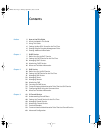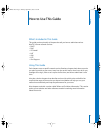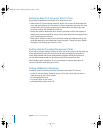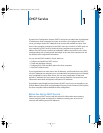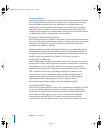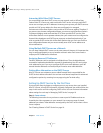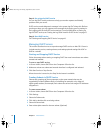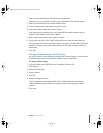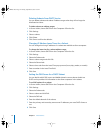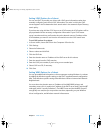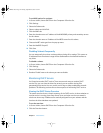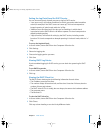
8 Chapter 1
DHCP Service
Creating Subnets
Subnets are groupings of computers on the same network that simplify administration.
You can organize subnets any way that is useful to you. For example, you can create
subnets for different groups within your organization or for different floors of a
building. Once you have grouped client computers into subnets, you can configure
options for all the computers in a subnet at one time instead of setting options for
individual client computers. Each subnet needs a way to connect to the other subnets.
A hardware device called a
router
typically connects subnets.
Assigning IP Addresses Dynamically
With dynamic allocation, an IP address is assigned for a limited period of time (the
lease
time
) or until the client computer doesn’t need the IP address, whichever comes first. By
using short leases, DHCP can reassign IP addresses on networks that have more
computers than available IP addresses.
Addresses allocated to Virtual Private Network (VPN) clients are distributed much like
DHCP addresses, but they don’t come out of the same range of addresses as DHCP. If
you plan on using VPN, be sure to leave some addresses unallocated by DHCP for use
by VPN. To learn more about VPN, see Chapter 5, “VPN Service,” on page 71.
Using Static IP Addresses
Static IP addresses are assigned to a computer or device once and then don’t change.
You may want to assign static IP addresses to computers that must have a continuous
Internet presence, such as web servers. Other devices that must be continuously
available to network users, such as printers, may also benefit from static IP addresses.
Static IP addresses must be set up manually by entering the IP address on the
computer or device that is assigned the address. Manually configured static IP
addresses avoid possible issues certain services may have with DHCP-assigned
addresses and avoid the delay required for DHCP to assign an address.
Don’t include Static IP address ranges in the range distributed by DHCP.
Locating the DHCP Server
When a client computer looks for a DHCP server, it broadcasts a message. If your DHCP
server is on a different subnet from the client computer, you must make sure the
routers that connect your subnets can forward the client broadcasts and the DHCP
server responses. A relay agent or router on your network that can relay BootP
communications will work for DHCP. If you don’t have a means to relay BootP
communications, you must place the DHCP server on the same subnet as your client.
LL2351.Book Page 8 Monday, September 8, 2003 2:47 PM





